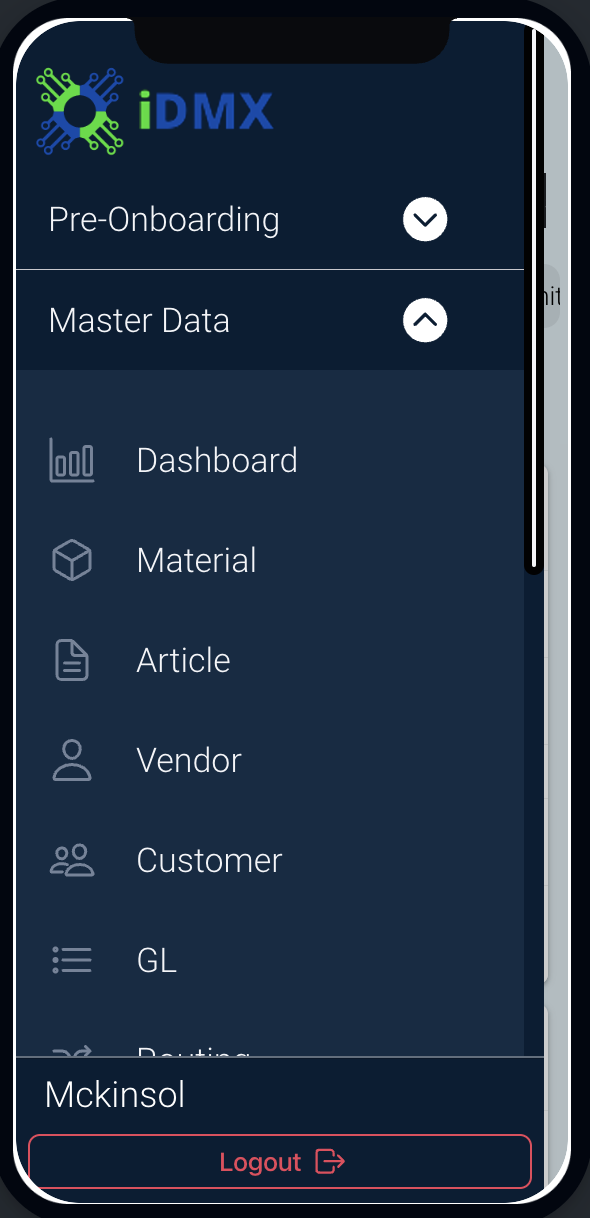McKinsol's IDMX, specializing in Master Data Management (MDM), emphasizes control over vital organizational data like customers and products. Proper Master Data Management ensures better decisions, cost reduction, and compliance with regulations. Our approach, organized into governance, processes, content & quality, and systems & tooling, focuses on automation opportunities within operational processes. Understanding how Master Data supports business processes is crucial for evaluating automation potential, considering factors such as changes, errors, and optimal investment. Explore the four building blocks to enhance Master Data Management and unlock efficiency gains.

Utilizing iDMX Master Data Management offers a swift implementation compared to other MDM applications. It proves cost-effective as it is less expensive than human labor, with a software license available at a fraction of full-time equivalent (FTE) costs, performing tasks equivalent to multiple FTEs. The development of a software robot in a standard business process can be completed within weeks, ensuring a rapid return on investment. Typically implemented through a Center of Excellence (CoE), iDMX involves both business and IT, fostering close alignment with process specialists for tailored, business-focused solutions. Apart from quick ROI and streamlined implementation, iDMX Master Data Management boasts various additional benefits relevant to MDM. Furthermore, iDMX facilitates deployment with off-the-shelf RPA bots capable of automating tasks like reading emails and generating master data requests.

Master data management focuses on controlling an organization's crucial data related to objects like customers, employees, and products. Accurate master data leads to better decision-making, reduced costs, enhanced efficiency, and regulatory compliance.
To harness these benefits, McKinsol's NeuVays has developed a comprehensive approach organized into four key building blocks: governance, processes, content & quality, and systems & tooling. While building capabilities in these blocks improves MDM, this article emphasizes processes with automation potential. Operational processes within MDM support daily business operations, offering opportunities for master data maintenance through creation, updating, deletion, or cleansing.
Understanding how master data supports business processes is crucial to evaluating automation's efficiency gains. Considering changes and error risks in MDM processes is essential, as not all operations are suitable for automation. Thoroughly evaluating these factors is key to making an optimal investment in automation.
1. Data Control and Governance: Master Data Management ensures robust control and governance, maintaining data accuracy and compliance through predefined standards.
2. Centralized Data Repository: MDM establishes a centralized repository, reducing redundancy and providing a single, authoritative source for master data.
3. Data Quality Management: MDM implements tools for data cleansing, validation, and enrichment, ensuring accurate and high-quality master data.
4. Integration Capabilities with API: MDM seamlessly integrates with diverse systems and applications through APIs, synchronizing master data for enhanced operational efficiency.
5. Scalability and Flexibility: MDM solutions are scalable and adaptable, accommodating evolving business needs, data models, and processes for sustainable master data management.
Databases commonly incorporate basic data validation controls to sift through inaccurate input, iDMX Master Data Management offers a superior solution for advanced validation needs. Particularly beneficial for cross-checking data against diverse internal and external sources, iDMX automates this process comprehensively, ensuring a seamless end-to-end validation workflow. By leveraging iDMX, organizations can go beyond basic database controls, enhancing the accuracy and reliability of their data validation processes through automated checks that span a spectrum of internal and external data repositories.
Processing master data updates involves managing changes to essential organizational information. This encompasses both single creation and mass creation of master data.
Single Creation Master Data: In the single creation process, administrators or authorized users input individual data points through designated forms or systems. This meticulous approach is suitable for scenarios where singular updates or additions to master data are necessary. Users input details like customer information, employee records, or product specifications one at a time, ensuring accuracy and specificity in the data creation process.
Mass Creation Master Data: Contrastingly, mass creation addresses scenarios where bulk updates are required. This method is particularly useful when organizations need to introduce a large volume of new records simultaneously, such as during system implementations or data migrations. Tools and processes for mass creation enable efficient and streamlined handling of extensive datasets, ensuring uniformity and adherence to predefined data standards.
Another noteworthy advantage of leveraging iDMX is its certified implementation time, validated by SAP® for its seamless and out-of-the-box integration capabilities with SAP S/4 HANA®. This certification ensures that iDMX is not only proficient in its implementation but is also recognized for its native compatibility with SAP S/4 HANA®, a leading enterprise resource planning (ERP) system. This endorsement by SAP® underscores iDMX's reliability and efficiency in effortlessly integrating with SAP S/4 HANA®, contributing to a streamlined and efficient implementation process.

iDMX is a suite of software applications built on a common platform and the most popular is Master Data Management (MDM). The iDMX Master Data Management module takes care of almost all types of master data such as Material, Vendor, Customer, Bill-of-Materials, Routing, GL Master, Profit Center, Cost Center etc. It takes care of additional areas of data such as Supplier Lifecycle Management, Sales Order Maintenance etc.
This is SAP® Certified software for interoperability with SAP S/4 HANA®, SAP S/4 Fashion® and SAP ECC®.

To leverage the benefits of iDMX Master Data Management, one could consider looking at the main activities that often take place within operational processes.
a. Auto correction / auto completion: a requestor of master data updates often makes use of a standardized form to submit their request. Even though autocomplete and auto correction measures have long been applied to support users in filling out their request, iDMX Master Data Management can be used to validate input based on external data sources – offering the requester details to help them fill in and submit their request.
b. Unstructured data: OCR (Optical Character Recognition), pattern recognition technologies and intelligent automation help with extracting data from various formats, automating parts of manual data entry within master data requests.
c. Validate the request for completeness and validity: the standardized format for requesting an update can be validated by the robot. If crucial details are missing or not in accordance with pre-set rules, the robot will inform the requester that data must be added, canceling the original request.
Adequate data validation controls to filter out incorrect input data can often be embedded in databases. However, for more enhanced validation such as cross-checking data against various internal and external sources, iDMX Master Data Management is an excellent solution to automate this task from end to end.
iDMX Master Data Management can be easily configured to update the requester of the master data update by email. In addition, iMDX can also request for additional data which is still missing.
